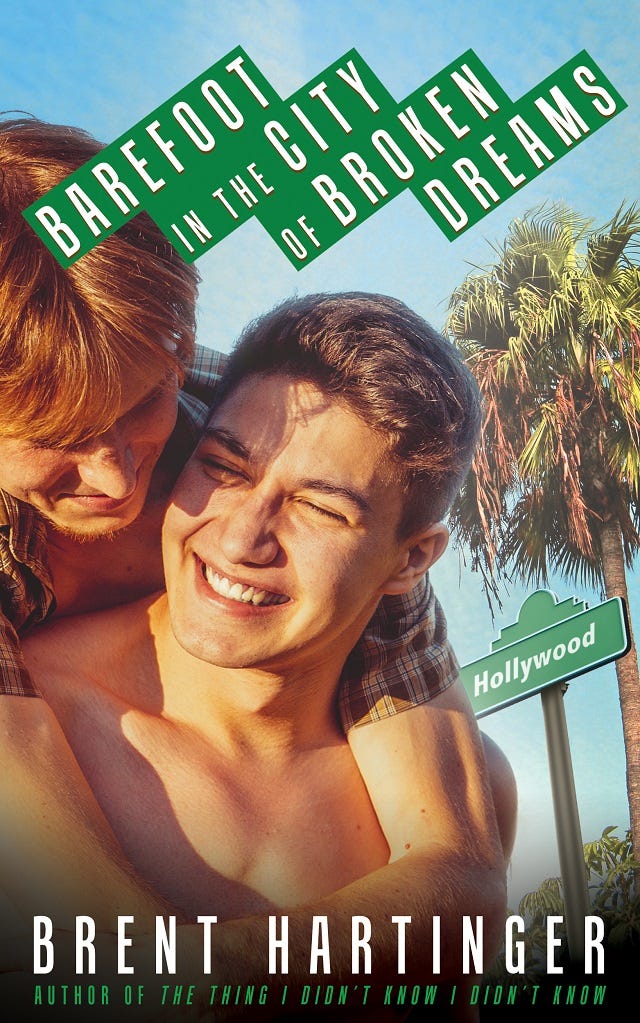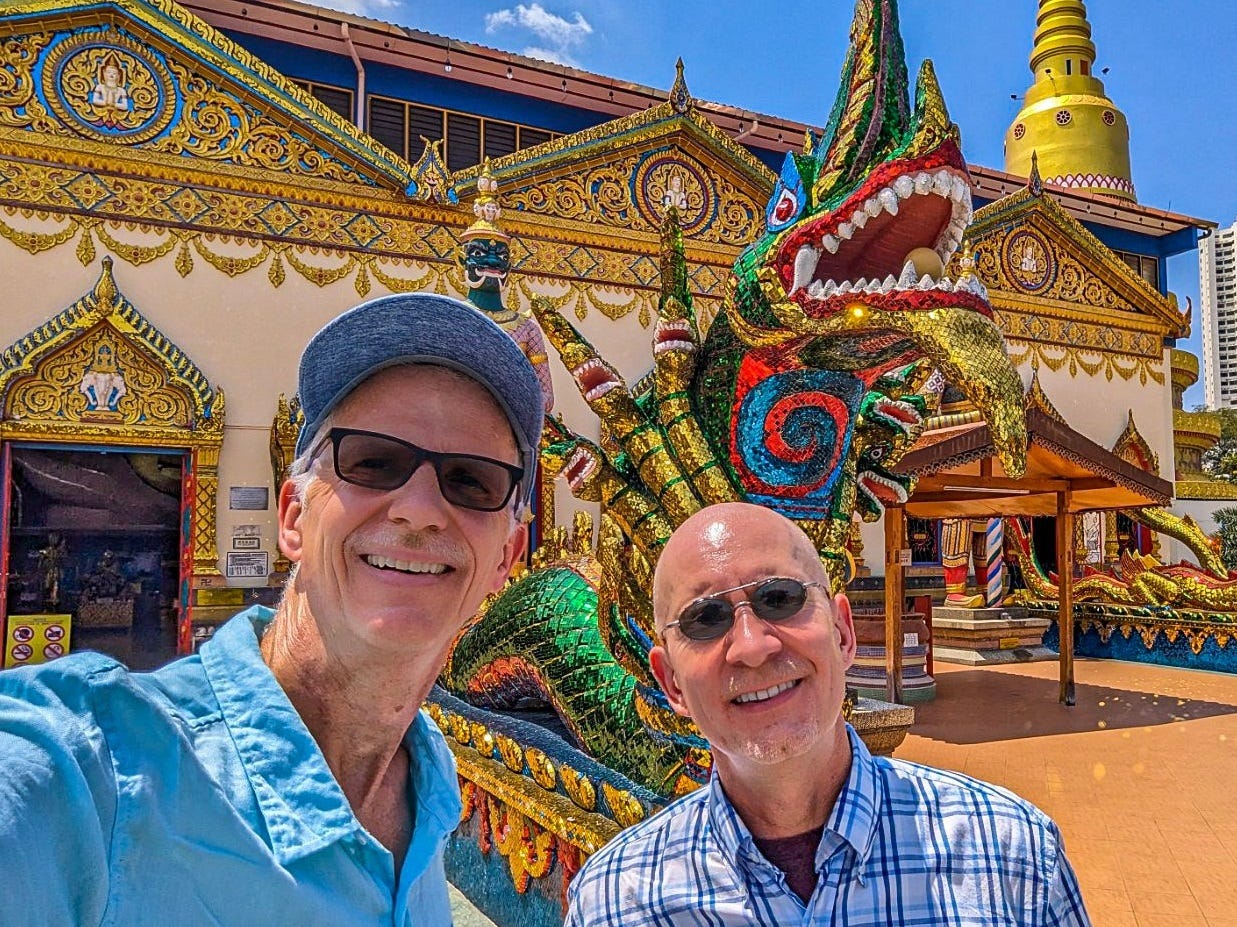For 20 Years, I Regretted Leaving Hollywood. Lately, I Think I Made the Right Call.
They say you can't ever know if the Path Not Taken was the better choice. But maybe you can.
For the audio version of this article, read by the author, go here.
Years ago, back in the early 00s, Michael and I moved to Los Angeles so I could try my hand as a screenwriter. I immediately enrolled in the School of Hard Knocks, doing everything I could to get my screenplays produced.
But Michael and I hated Los Angeles — especially the status-seekers, and the desperation of all the people trying to “break into” movies, not to mention the absolutely hellish traffic. After a year and a half, despite my not finding any success, we decided to move back to Seattle.
Ironically, right after we made the decision to leave, a more established mentor-friend told me that if his new TV pilot was picked up by the network, he would hire me as a writer.
Michael and I were so unhappy, we left anyway. A week after we arrived home, my friend’s latest movie was a massive, headline-making bomb, and his pilot was dead in the water.
After leaving Los Angeles, I focused more on writing and publishing novels, and ended up eking out a modestly successful career in fiction.
In fact, my time in Los Angeles inspired one of these novels, Barefoot in the City of Broken Dreams — which, apart from this newsletter, is the most autobiographical thing I’ve ever written. I didn’t realize until later how — no joke — my experience in Hollywood mirrored almost exactly the plot of the classic movie Sunset Boulevard.
I also kept writing screenplays. Over the following decades, I won a lot of awards, and I had a few minor screenwriting successes. I had many more close calls — major, life-changing deals that were often right on the verge of happening.
But none of those major deals ever did happen, and I never had anything approaching a real, break-out success.
As a result, I’ve always looked back on Michael’s and my decision to leave Los Angeles with a lot of regret.
What if I’d stayed? Would I have eventually found success? Maybe I’d have an Academy Award right now!
I still have a number of screenplays in various stages of development, including one that’s been under option for an incredible sixteen years. These projects are all my children, and I’ve long dreamed of the day I’d finally see them realized on the big screen.
But in the last year, I’ve heard from almost all of the producers involved with all these projects, who’ve told me some variation of the same thing: “Don’t get your hopes up. It’s absolutely brutal trying to get a feature film produced right now.”
Yeah, sure, people like Christopher Nolan and Quentin Tarantino will always get their movies made, and the streamers still do lots of very specific algorithm-driven stuff.
At the end of Barefoot in the City of Broken Dreams, my main character finally realizes:
“Sure, Los Angeles grants people’s dreams every now and then. It has to do that, otherwise it would be a slot machine that never paid out, so people would eventually stop playing.”
But for the most part, when it comes to movies, the studios and streamers have all fallen victim to the franchise-sequel-remake virus. Exploding advertising costs haven’t helped, nor did Covid, which shuttered theaters — even now, the most profitable part of the feature film business.
As one writer recently put it, “You can write an original script everyone loves, and then it’s, like, ‘Ooh, we can’t make this, but please take your pick of our upcoming Batman projects!’”
For a while, TV was different. Since the early 00s, with the rise of cable and then streaming, we’ve been in the middle of a very obvious television renaissance, and we’ve all enjoyed some of the best TV programming ever produced.
But now the same creative-destructive forces are hitting that medium too. A-list actors are still making bank in TV, and I’m sure Aaron Sorkin and Shonda Rhimes are doing fine too, but almost everyone else is making squat, even as the cost of living explodes. The studios and streamers have found extremely creative ways to pay writers less and less.
As a result, movie and TV writers are miserable. The members of the Writers Guild of America recently voted to go on strike — with an incredible 97.85% of membership voting in favor.
Unfortunately, the strike comes on the heels of massive lay-offs throughout the entertainment industry — all because Wall Street recently soured on the streamers’ potential to ever turn major profits, resulting in a plunge in investment dollars.
There’s a racial element too. In the last decade, Hollywood has made it a very high priority to hire more female and non-white creators — exactly at the moment when Hollywood began paying all creatives less, and when they’re paying new writers the least amount of anyone.
No matter what happens, many writers are almost certainly going to be disappointed by the outcome of this current strike. The “olden days,” when it could be quite lucrative to write for Hollywood, are almost certainly never coming back — in part, because there is so much more content now. There are more jobs, and more diversity too, but that means the bigger pie is being sliced into smaller and smaller pieces.
Need travel or international health insurance? We recommend Genki or Safety Wing.
For a travel credit card, get 80,000 free miles with Chase United, or get 60,000 free miles with Chase Sapphire Preferred.
Using the above affiliate links will cost you nothing and help support our newsletter.
I’m not a member of the Writers Guild — all my screen work so far has been “indie” — but I still think the writers were right to strike. It’s time to draw a line in the sand.
But recent events have also changed the way I think about that time Michael and I spent in Hollywood, and maybe my future in screenwriting too.
To be honest, I hate the online discourse surrounding “making it” in Hollywood — and creative work in general. I’m on record as thinking, “Never give up your dreams!” is absolutely terrible advice.
I’ve known a lot of writers in my life, and virtually every one, even those who are “successful,” has a tale of soul-killing hardship and woe. My Hollywood mentor whose movie bombed so spectacularly? After that, his career was effectively over.
I know people hate hearing professional writers complain about their terrible lot in life. “Yes, I get paid to do this amazing job that most people would kill to do — one that many people do for free — but I don’t get paid enough.”
Part of being an adult is accepting the consequences of the choices we make.
But, well, I don’t think people realize what a slog the life of a professional writer is for most of the people who do it. There is so much misery, bitterness, and despair.
I can’t help but compare that vibe to the one I get in the nomad and expat circles I frequent now — and how it’s the exact opposite of misery, bitterness, and despair.
I had dinner with a group of nomad friends last night, and at one point I realized how, unprompted, we had literally gone around the table with each of us waxing rhapsodic about how phenomenal our lives are since we left home.
I know I’m in a very different place now than when Michael and I moved to Hollywood all those years ago. I’m older, with very different priorities, and I have more money now — because I’m an incredibly privileged American, because I’ve had a few lucky breaks, and because I’ve hustled my ass off for thirty Goddamn years.
I used to think, “If I’d never left Hollywood, I might have an Academy Award right now!”
But lately, I’m thinking, “If I’d never left Hollywood, I might never have become a nomad.”
As for that Academy Award, keep it. There’s no place for it in my backpack anyway.
Brent Hartinger is a screenwriter and author. Check out my new newsletter about my books and movies at www.BrentHartinger.com.






This piece was really relatable to me. I tried to make it as a screenwriter and actor for several years before getting back my travel roots. When I was pursuing screenwriting and acting, I was sucked into the world of egos and scams. In my case, it was mostly producers and industry professionals trying to get me naked, which lead to a few chapters my parents weren’t too fond of reading in my book Living with the In-Laws. The superficiality of the film world and the amount of trash screenplays being turned into movies got to me, so I went to university, started traveling again, and noticed it wasn’t just the film world that was all about money and “making it,” but American (in my case Canadian) culture.
Now I’m in Spain, and nobody asks me about my job or salary, which feels nice, being broke AF and all. When I think about my career goals, I feel like a failure, but here, people are more interested in the person I am, what I’m learning, my experiences, and of course, when I’ve available for a beer and tapas.
That being said, I still love film and screenwriting. I’m slowing working on a new screenplay that I could produce in Spain. Have you had any experience screenwriting outside of the Hollywood scene? I wonder if screenwriters not trying to make it Hollywood are less miserable.
The one experience I had selling something to Hollywood made me want to peel my skin off, so this really made me feel better about moving to the mountains.